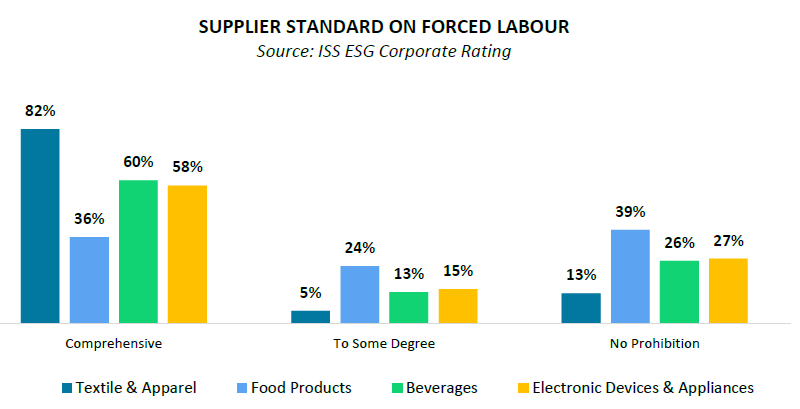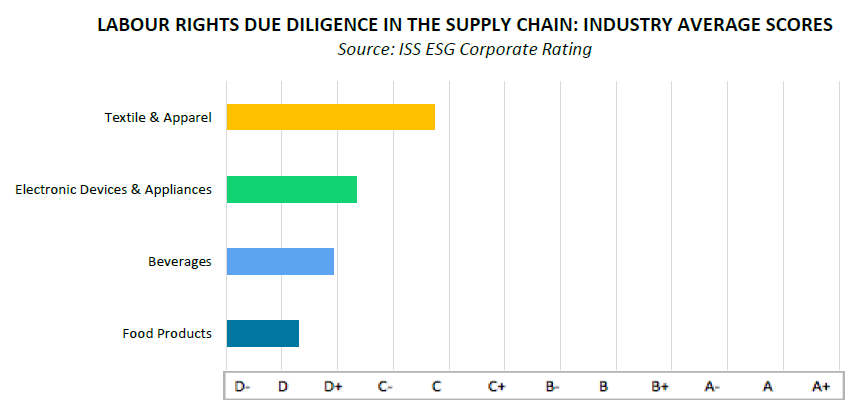This post is based on an ISS memorandum by Clare Bartram, Associate, Norm-Based Research; Lisa Häuser, Associate Vice President, Corporate Ratings; Valentina Boltze, Associate Vice President, Corporate Ratings; Gregory Richards, Senior Associate, Stewardship and Engagement for ISS ESG, the responsible investment arm of Institutional Shareholder Services; and Chris Miller, Vice President for ISS Governance Research.
Assessing Preparedness to Address Modern Slavery with the ISS ESG Corporate Rating
The ISS ESG Corporate Rating assesses the degree to which companies are prepared to identify and act upon potential and actual human and labour rights risks and impacts across their value chain. This also includes Modern Slavery, which is part of the standard set of universal ESG topics assessed across all industries and companies. At the same time, the ESG Corporate Rating accounts for the highly varying risk exposure of industries and companies by adjusting indicator weights and applicability. Factors considered to determine the sector- and company-specific materiality include, among others, the degree of outsourcing in an industry, the specific business model of a company, the geographic distribution of its supplier base as well as the dependence on high-risk raw materials.
Supplier standard on forced labour
The ISS ESG Corporate Rating assesses whether companies have implemented a supplier standard which articulates clear and binding expectations to their suppliers and contractors regarding labour rights and working conditions in line with internationally recognised minimum standards such as the ILO Declaration on Fundamental Principles and Rights at Work. The use of modern slavery and its different forms such as forced or compulsory labour, prison labour and debt bondage should clearly be prohibited in a company’s supplier standards to receive the highest grade.
A comparison of selected high-risk industries shows that in the Textiles & Apparel industry, over 80% of rated companies have implemented a comprehensive supplier standard on forced labour. Almost 40% of Food Products companies do not demonstrate that they have implemented any supplier standards prohibiting forced labour, however.

Measures to ensure & promote adherence to labour standards in the supply chain
While implementing a supplier standard on labour rights is an important first step, companies need to actively ensure that the principles of the standard are adhered to on the ground. The scope and quality of due diligence measures is assessed in detail in the ISS ESG Corporate Rating. This includes the assessment of measures related to supply chain traceability, risk assessments, monitoring, grievance mechanisms for workers, corrective action procedures, and the transparent disclosure of the companies’ supplier base, audit findings and related mitigation measures.
Beyond focusing merely on compliance, the ESG Corporate Rating also comprehensively assesses whether companies in high-risk sectors actively enable and support suppliers in providing good working conditions. This includes providing in-depth training and capacity building on labour rights and human capital management.
As labour rights violations in sourcing countries are often the symptom of widespread structural issues that cannot be tackled by single companies, cooperation with global and local unions and NGOs, support of the fundamental rights to freedom of association and collective bargaining, as well as the participation in multi-stakeholder or industry initiatives which address labour rights issues, are assessed positively as well.
The ESG Corporate Rating also addresses whether companies critically assess the potentially detrimental impact their own purchasing practices may have on the suppliers’ ability to meet labour rights provisions. This refers to the effects that cost pressure, tight lead times and changes to orders on short notice have on workers’ wages and overtime.
As a further reality check, the involvement in a controversy regarding labour rights in the supply chain (as identified by ISS ESG’s NBR service) leads to a downgrading for the ‘due diligence in the supply chain’ topic in the ISS ESG Corporate Rating.
Room for improvement in high-risk industries
The average grades of the indicators assessing the standards and measures to ensure and promote the adherence to labour standards in the supply chain show significant room for improvement for all high-risk industries. They also show significant differences in performance across industries. The Textiles & Apparel industry has the highest average grade on the Twelve-point scale from A+ (the company shows excellent performance) to D- (the company shows poor performance or fails to demonstrate any commitment to appropriately address the topic). The other three industries lag significantly behind, with Food Products demonstrating the poorest performance.

The reason for these differences may lie in the fact that many companies in the Textile & Apparel industry are widely known brands which are more vulnerable to reputational risks, as they sell goods to end consumers and want to convey a certain brand image. Furthermore, the industry has been in the spotlight of prominent NGO campaigns decrying worker exploitation for many decades, and may therefore have faced more pressure to implement at least basic standards and procedures as a reaction to these allegations compared to other industries.
The complete publication is available here.
 Print
Print